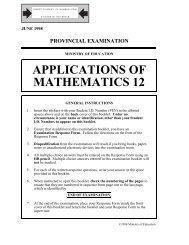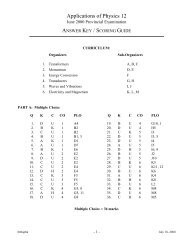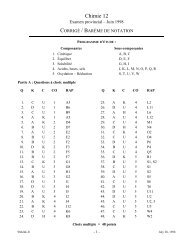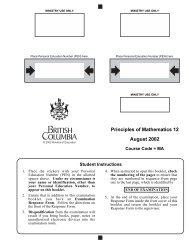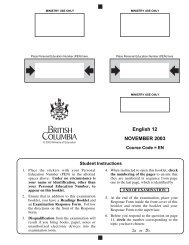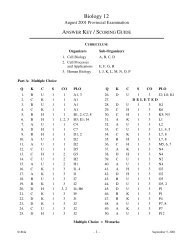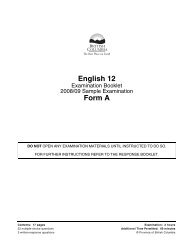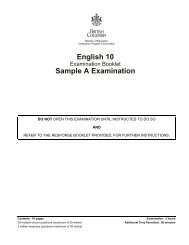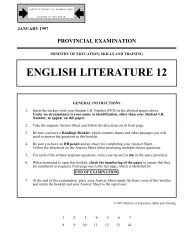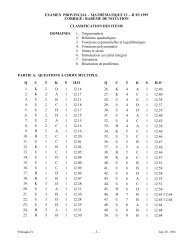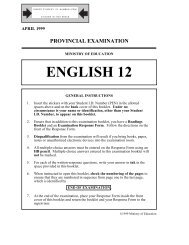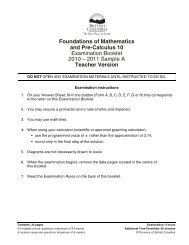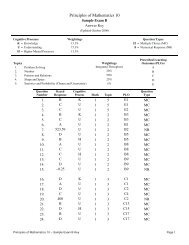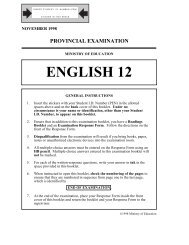english literature 12 - QuestionBank.CA
english literature 12 - QuestionBank.CA
english literature 12 - QuestionBank.CA
Create successful ePaper yourself
Turn your PDF publications into a flip-book with our unique Google optimized e-Paper software.
INSERT STUDENT I.D. NUMBER (PEN)STICKER IN THIS SPACEJUNE 1999PROVINCIAL EXAMINATIONMINISTRY OF EDU<strong>CA</strong>TIONENGLISH LITERATURE <strong>12</strong>GENERAL INSTRUCTIONS1. Insert the stickers with your Student I.D. Number (PEN) in the allottedspaces above and on the back cover of this booklet. Under nocircumstance is your name or identification, other than your StudentI.D. Number, to appear on this booklet.2. Ensure that in addition to this examination booklet, you have a ReadingsBooklet and an Examination Response Form. Follow the directions on thefront of the Response Form.3. Disqualification from the examination will result if you bring books, paper,notes or unauthorized electronic devices into the examination room.4. All multiple-choice answers must be entered on the Response Form using anHB pencil. Multiple-choice answers entered in this examination booklet willnot be marked.5. For each of the written-response questions, write your answer in ink in thespace provided in this booklet.6. When instructed to open this booklet, check the numbering of the pages toensure that they are numbered in sequence from page one to the last page,which is identified byEND OF EXAMINATION .7. At the end of the examination, place your Response Form inside the frontcover of this booklet and return the booklet and your Response Form to thesupervisor.©1999 Ministry of Education
THIS PAGE INTENTIONALLY BLANK
THIS PAGE INTENTIONALLY BLANK
SECTION 1: MULTIPLE CHOICEValue: 20 marksINSTRUCTIONS:Suggested Time: 15 minutesFor each multiple-choice question, including those on the Sight Passages, selectthe best answer and record your choice on the Response Form provided. Usingan HB pencil, completely fill in the circle that has the letter corresponding toyour answer.Literary Selections1. In “The Prologue” to The Canterbury Tales, the Knight joins the pilgrimage toA. meet his friends.B. give thanks to God.C. show his gentleness.D. demonstrate courtesy.2. In Shakespeare’s Sonnet 29 “When in disgrace with fortune and men’s eyes,” the speaker’sdepressed state of mind is relieved by theA. wealth of kings.B. awareness he is loved.C. hymns at Heaven’s gate.D. song of the lark at daybreak.3. In Paradise Lost, Satan vows toA. mend his evil ways.B. wage war with God.C. cultivate a magnificent garden.D. share his power with Beelzebub.4. At the end of The Rape of the Lock, Belinda’s lost lock of hair isA. seen in the sky.B. hidden in a snuffbox.C. returned to its owner.D. found around the baron’s neck.- 1 -OVER
5. In the “Elegy Written in a Country Churchyard,” Gray’s speaker stresses theA. laziness of the rural poor.B. shallowness of family life.C. generosity of land owners.D. equalizing nature of death.6. In “My Heart Leaps Up,” WordsworthA. admires the power of the ocean.B. watches a falcon slowly disappear.C. celebrates a lifelong love of nature.D. recalls the simple joys of a duchess.7. In “The Rime of the Ancient Mariner,” after the Mariner kills the albatross, theA. ship is becalmed.B. ice surrounds the ship.C. wedding guest arrives.D. sailors fight among themselves.8. In “My Last Duchess,” the Duke states that his “object” is toA. display his “skill in speech.”B. marry the Count’s daughter.C. describe the Duchess in glowing terms.D. offer generous hospitality to his listener.9. In Tennyson’s “Ulysses,” Telemachus is likely to becomeA. a rebellious youth.B. a conscientious ruler.C. an adventurous traveller.D. an irresponsible successor.10. The “hollow men” of Eliot’s poem are characterized by theirA. paralyzed inaction.B. modern inventions.C. religious convictions.D. inability to feed the poor.- 2 -
Literary Forms and TechniquesINSTRUCTIONS:Students are reminded that in this section, examples may be from works outside theCore Studies Readings List.11. “Roll on, thou deep and dark blue Ocean—roll!Ten thousand fleets sweep over thee in vain…”These lines illustrate the use ofA. simile.B. allusion.C. metonymy.D. apostrophe.<strong>12</strong>. “The others leap, shoutFreedom!The moving water will not show memy reflection.”These lines are an example ofA. free verse.B. terza rima.C. blank verse.D. Spenserian stanza.13. “Till ’a the seas gang dry, my dear,And the rocks melt wi’ the sun:O I will love thee still, my dear,While the sands o’ life shall run.”These lines illustrate the use ofA. kenning.B. hyperbole.C. onomatopoeia.D. internal rhyme.- 3 -OVER
14. “The Child is father of the Man;And I could wish my days to beBound each to each by natural piety.”These lines illustrate the use ofA. simile.B. paradox.C. free verse.D. blank verse.15. “Dim, through the misty panes and thick green light,As under a green sea, I saw him drowning.”These lines contain an example ofA. simile.B. allusion.C. apostrophe.D. personification.Recognition of Authors and TitlesINSTRUCTIONS:Select the author of the quotation or the title of the selection from which thequotation is taken.16. “He strode quickly across the inlaidFloor, snarling and fierce: his eyesGleamed in the darkness, burned with a gruesomeLight.”A. “Song”B. BeowulfC. Paradise LostD. “The Hollow Men”17. “If they be two, they are two soAs stiff twin compasses are two…”A. PopeB. BlakeC. DonneD. Milton- 4 -
18. “Old age should burn and rave at close of day;Rage, rage against the dying of the light.”A. “Ulysses”B. “The Tyger”C. “Apostrophe to the Ocean”D. “Do Not Go Gentle into That Good Night”19. “And ice, mast-high, came floating by,As green as emerald.”A. “Pretty”B. “Disembarking at Quebec”C. “The Rime of the Ancient Mariner”D. “Because I Could Not Stop For Death”20. “Listen! you hear the grating roarOf pebbles which the waves draw back, and fling,At their return, up the high strand,Begin, and cease, and then again begin…”A. ByronB. ArnoldC. ShelleyD. Atwood- 5 -OVER
SECTION 2: FAMILIAR SIGHT PASSAGEValue: 15 marksINSTRUCTIONS:Suggested Time: 25 minutesRead “Ode to a Nightingale” on pages 2 and 3 in the Readings Booklet. Forquestions 21 to 25, select the best answer and record your choice on the ResponseForm provided.21. In stanza 1, the “light-wingèd Dryad” (line 7) is a reference toA. a tree.B. a drink.C. the wind.D. the nightingale.22. The speaker’s preferred means of escape from the pain of the world isA. “the warm South” (line 15).B. “a draught of vintage” (line 11).C. “Dance, and Provençal song” (line 14).D. “the viewless wings of Poesy” (line 33).23. The bird’s song is referred to as both a “plaintive anthem” (line 75) and aA. “soft incense” (line 42).B. “high requiem” (line 60).C. “musèd rhyme” (line 53).D. “murmurous haunt” (line 50).24. In line 73, “fancy” refers toA. desire.B. reason.C. beauty.D. imagination.25. In the final stanza, the speaker isA. calm.B. joyful.C. vengeful.D. confused.- 6 -
“Ode to a Nightingale”(pages 2 and 3 in the Readings Booklet)INSTRUCTIONS:In a well-organized paragraph of approximately <strong>12</strong>5 words, respond to thefollowing question. Write your answer in ink.1. Show that Keats’s poem contrasts the bird’s song with the speaker’s sense of humanlimitations.(10 marks)- 7 -OVER
UNFAMILIAR SIGHT PASSAGEValue: 15 marksINSTRUCTIONS:Suggested Time: 25 minutesRead “The Three Ravens” on pages 4 and 5 in the Readings Booklet. Forquestions 26 to 30, select the best answer and record your choice on the ResponseForm provided.26. When the knight is buried, it is likely that the ravens will beA. relieved.B. gratified.C. vengeful.D. disappointed.27. The raven’s selfishness is contrasted with the doe’sA. modesty.B. idealism.C. compassion.D. indifference.28. The word “lemman” (line 69) refers to theA. doe.B. hawk.C. ravens.D. hounds.29. Line 69 usesA. apostrophe.B. parallelism.C. onomatopoeia.D. internal rhyme.30. The poem praisesA. truth.B. loyalty.C. yearning.D. ingenuity.- 8 -
“The Three Ravens”(pages 4 and 5 in the Readings Booklet)INSTRUCTIONS:In a well-organized paragraph of approximately <strong>12</strong>5 words, respond to thefollowing question. Write your answer in ink.2. Identify and discuss three characteristics of the poem “The Three Ravens” which help classifyit as a ballad.(10 marks)- 9 -OVER
SECTION 3: SHAKESPEAREAN DRAMAValue: 10 marksINSTRUCTIONS:Suggested Time: 15 minutesChoose one of the six passages on pages 6 to 8 in the Readings Booklet. For theselected passage, write a single paragraph answer of approximately <strong>12</strong>5 words inwhich you do one or both of the following:1. explain how the passage reveals the character of the speaker(s).2. explain how the passage relates to the themes of the play.Your response may place the passage within the context of the play; however, do notmerely summarize the plot elements of the passage.Organization and Planning- 10 -
I have selected passage _____.- 11 -OVER
THIS PAGE INTENTIONALLY BLANK- <strong>12</strong> -
|||||||||||||||||||||||||||||||||||||||||||||||||||||||||||Value: 20 marksINSTRUCTIONS:SECTION 4: GENERAL ESSAY- 13 -Suggested Time: 40 minutesChoose one of the following topics. In an essay of approximately 250 words,develop a concise, focused answer to show your knowledge and understanding ofthe topic. Include specific references to the works you discuss. You may notneed all the space provided for your answer. Do not double space. Students areencouraged to refer to works not on the Core Studies Readings List. However,students will not be penalized for utilizing only core works in responding to aquestion.9. LITERARY HERITAGE OF ONE PERIODBy reference to two or more works, show that writers of the Victorian period were aware ofthe sadness of human existence.10. LITERARY ELEMENTSORBy reference to works from two or more literary periods, show that satire exposes humanshortcomings.OR11. UNIVERSAL THEMES AND ARCHETYPESBy reference to works from two or more literary periods, show that writers often deal withthe struggle between good and evil, or right and wrong.You may detach this page for convenient reference.Exercise care when tearing along perforations.OVER
Organization and Planning- 14 -
I have selected topic _____.FINISHED WORK- 15 -OVER
FINISHED WORK- 16 -
FINISHED WORKEND OF EXAMINATION- 17 -
THIS PAGE INTENTIONALLY BLANK
||||||||||||||||||||||||||||||||||||||||||||||||||||||||||||
INSERT STUDENT I.D. NUMBER (PEN)STICKER IN THIS SPACEENGLISHLITERATURE <strong>12</strong>June 1999Course Code = LIT
FOR OFFICE USE ONLYENGLISHLITERATURE <strong>12</strong>June 1999Course Code = LITScore both ofthe followingquestions.Score forQuestion 1:1. _____(10)Score forQuestion 2:2. _____(10)Score oneof the sixresponses.Score forQuestion 3:3. _____(10)Score forQuestion 4:4. _____(10)Score forQuestion 5:5. _____(10)Score forQuestion 6:6. _____(10)Score forQuestion 7:7. _____(10)Score forQuestion 8:8. _____(10)Score one ofthe three topics.Score forQuestion 9:9. _____(20)Score forQuestion 10:10. _____(20)Score forQuestion 11:11. _____(20)
ENGLISH LITERATURE <strong>12</strong>READINGS BOOKLETJUNE 1999©1999 Ministry of Education
THIS PAGE INTENTIONALLY BLANK- 1 -
SECTION 2: FAMILIAR SIGHT PASSAGEINSTRUCTIONS:Read the following passage and answer the questions on pages 6 and 7 in theexamination booklet.Ode to a Nightingale1510152025303540My heart aches, and a drowsy numbness painsMy sense, as though of hemlock I had drunk,Or emptied some dull opiate to the drainsOne minute past, and Lethe-wards had sunk:’Tis not through envy of thy happy lot,But being too happy in thine happiness––That thou, light-wingèd Dryad of the trees,In some melodious plotOf beechen green, and shadows numberless,Singest of summer in full-throated ease.O for a draught of vintage! that hath beenCooled a long age in the deep-delvèd earth.Tasting of Flora and the country green,Dance, and Provençal song, and sunburnt mirth!O for a beaker full of the warm South,Full of the true, the blushful Hippocrene,With beaded bubbles winking at the brim,And purple-stainèd mouth;That I might drink, and leave the world unseen,And with thee fade away into the forest dim:Fade far away, dissolve, and quite forgetWhat thou among the leaves hast never known,The weariness, the fever, and the fretHere, where men sit and hear each other groan;Where palsy shakes a few, sad, last gray hairs,Where youth grows pale and specter-thin, and dies;Where but to think is to be full of sorrowAnd leaden-eyed despairs,Where Beauty cannot keep her lustrous eyesOr new Love pine at them beyond tomorrow.Away! away! for I will fly to thee,Not charioted by Bacchus and his pards,But on the viewless wings of Poesy,Though the dull brain perplexes and retards:Already with thee! tender is the night,And haply the Queen-Moon is on her throne,Clustered around by all her starry Fays;But here there is no light,Save what from heaven is with the breezes blownThrough verdurous glooms and winding mossy ways.- 2 -
4550556065707580I cannot see what flowers are at my feet,Nor what soft incense hangs upon the boughs,But, in embalmèd darkness, guess each sweetWherewith the seasonable month endowsThe grass, the thicket, and the fruit tree wild;White hawthorn, and the pastoral eglantine;Fast fading violets covered up in leaves;And mid-May’s eldest child,The coming musk rose, full of dewy wine,The murmurous haunt of flies on summer eves.Darkling I listen; and, for many a timeI have been half in love with easeful Death,Called him soft names in many a musèd rhyme,To take into the air my quiet breath;Now more than ever seems it rich to die,To cease upon the midnight with no pain,While thou art pouring forth thy soul abroadIn such an ecstasy!Still wouldst thou sing, and I have ears in vain—To thy high requiem become a sod.Thou wast not born for death, immortal Bird!No hungry generations tread thee down;The voice I hear this passing night was heardIn ancient days by emperor and clown:Perhaps the selfsame song that found a pathThrough the sad heart of Ruth, when, sick for home,She stood in tears amid the alien corn;The same that ofttimes hathCharmed magic casements, opening on the foamOf perilous seas, in faery lands forlorn.Forlorn! the very word is like a bellTo toll me back from thee to my sole self!Adieu! the fancy cannot cheat so wellAs she is famed to do, deceiving elf.Adieu! adieu! thy plaintive anthem fadesPast the near meadows, over the still stream,Up the hillside; and now ’tis buried deepIn the next valley glades:Was it a vision, or a waking dream?Fled is that music—Do I wake or sleep?John Keats- 3 -
UNFAMILIAR SIGHT PASSAGEINSTRUCTIONS:Read the following passage and answer the questions on pages 8 and 9 in theexamination booklet.The Three Ravens15101520253035There were three ravens sat on a tree,Down a down, hay down, hay down,There were three ravens sat on a tree,With a down,There were three ravens sat on a tree,They were as black as they might be,With a down, derry, derry, derry, down, down.The one of them said to his mate,Down a down, hay down, hay down,The one of them said to his mate,With a down,The one of them said to his mate,“Where shall we our breakfast take?With a down, derry, derry, derry, down, down.“Down in yonder green fieldDown a down, hay down, hay down,Down in yonder green fieldWith a down,Down in yonder green fieldThere lies a knight slain under his shield.With a down, derry, derry, derry, down, down.“His hounds they lie down at his feet,Down a down, hay down, hay down,His hounds they lie down at his feet,With a down,His hounds they lie down at his feet,So well they can their master keep.With a down, derry, derry, derry, down, down.“His hawks they fly so eagerly 1 ,Down a down, hay down, hay down,His hawks they fly so eagerly,With a down,His hawks they fly so eagerly,There’s no fowl 2 dare him come nigh.”With a down, derry, derry, derry, down, down.1 eagerly: fiercely2 fowl: bird- 4 -
40455055606570Down there comes a fallow 3 doe,Down a down, hay down, hay down,Down there comes a fallow doe,With a down,Down there comes a fallow doe,As great with young as she might go 4 .With a down, derry, derry, derry, down, down.She lift up his bloody head,Down a down, hay down, hay down,She lift up his bloody head,With a down,She lift up his bloody head,And kissed his wounds that were so red.With a down, derry, derry, derry, down, down.She got him up upon her back,Down a down, hay down, hay down,She got him up upon her back,With a down,She got him up upon her back,And carried him to earthen lake.With a down, derry, derry, derry, down, down.She buried him before the prime 5 ;Down a down, hay down, hay down,She buried him before the prime;With a down,She buried him before the prime;She was dead herself ere evensong time.With a down, derry, derry, derry, down, down.God send every gentlemanDown a down, hay down, hay down,God send every gentlemanWith a down,God send every gentlemanSuch hawks, such hounds, and such a lemman 6 .With a down, derry, derry, derry, down, down.Anonymous3 fallow: red-brown4 go: walk5 prime: the first hour of the morning6 lemman: lover- 5 -
SECTION 3: SHAKESPEAREAN DRAMAINSTRUCTIONS:Choose any one of the following six passages. Write your paragraph answer in thespace provided on page 11 in the examination booklet.3. Hamlet (1600-1601)Hamlet:I have of late, butwherefore I know not, lost all my mirth, forgone allcustom of exercises; and indeed, it goes so heavilywith my disposition that this goodly frame, theearth, seems to me a sterile promontory; this mostexcellent canopy, the air, look you, this braveo’erhanging firmament, this majestical roof frettedwith golden fire: why, it appeareth nothing to mebut a foul and pestilent congregation of vapours.(II. ii. 303–311)OR4. Hamlet (1600-1601)Gertrude:There on the pendent boughs her crownet weedsClamb’ring to hang, an envious sliver broke,When down her weedy trophies and herselfFell in the weeping brook. Her clothes spread wide,And mermaidlike awhile they bore her up,Which time she chanted snatches of old lauds 1 ,As one incapable of her own distress,Or like a creature native and indued 2Unto that element. But long it could not beTill that her garments, heavy with their drink,Pulled the poor wretch from her melodious layTo muddy death.(IV. vii. 172–183)1 lauds: hymns2 indued: in harmony with- 6 -
OR5. The Tempest (1611)Ferdinand:My spirits, as in a dream, are all bound up.My father’s loss, the weakness which I feel,The wrack of all my friends, nor this man’s threatsTo whom I am subdued, are but light to me,Might I but through my prison once a dayBehold this maid. All corners else o’ th’ earthLet liberty make use of. Space enoughHave I in such a prison.(Act I. ii. 487–494)OR6. The Tempest (1611)Prospero:If I have too austerely punish’d you,Your compensation makes amends; for IHave given you here a third of mine own life,Or that for which I live; who once againI tender to thy hand. All thy vexationsWere but my trials of thy love, and thouHast strangely 1 stood the test. Here, afore heaven,I ratify this my rich gift. O Ferdinand,Do not smile at me that I boast her off,For thou shalt find she will outstrip all praiseAnd make it halt behind her.(Act IV. i. 1–11)1 strangely: respectfully- 7 -
OR7. King Lear (1603)Lear:If she [Goneril], must teem,Create her a child of spleen, that it may liveAnd be a thwart disnatured torment to her.Let it stamp wrinkles in her brow of youth,With cadent tears fret channels in her cheeks,Turn all her mother’s pains and benefitsTo laughter and contempt, that she may feelHow sharper than a serpent’s tooth it isTo have a thankless child.(Act I. iv. 288–296)OR8. King Lear (1603)Regan:Therefore I do advise you [Oswald], take this note:My lord is dead; Edmund and I have talked;And more convenient is he for my handThan for your lady’s: you may gather more.If you do find him, pray you, give him this;And when your mistress hears thus much from you,I pray, desire her call her wisdom to her.So, fare you well.If you do chance to hear of that blind traitor,Preferment falls on him that cuts him off.(Act IV. v. 29–38)- 8 -



